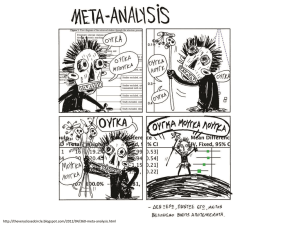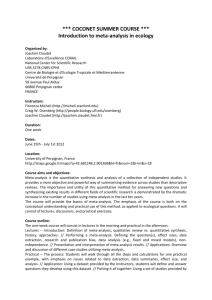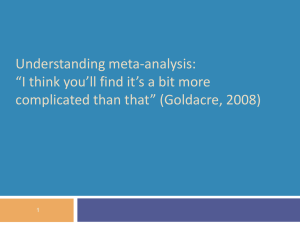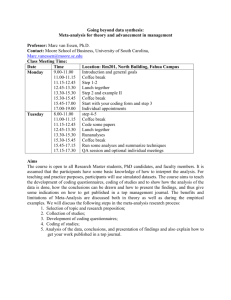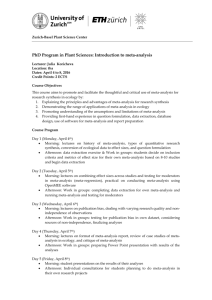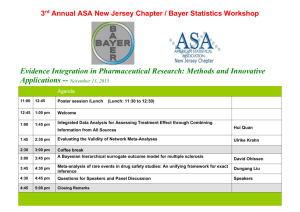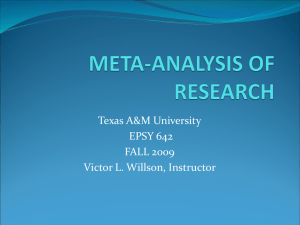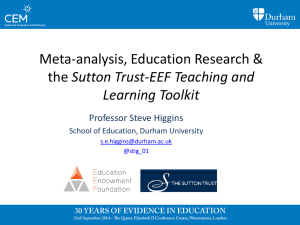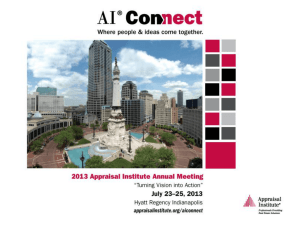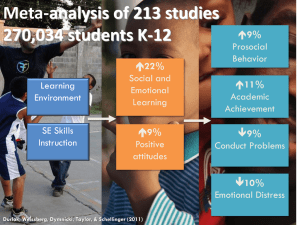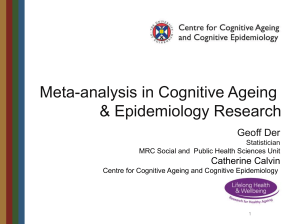Concept Mapping PowerPoint
advertisement
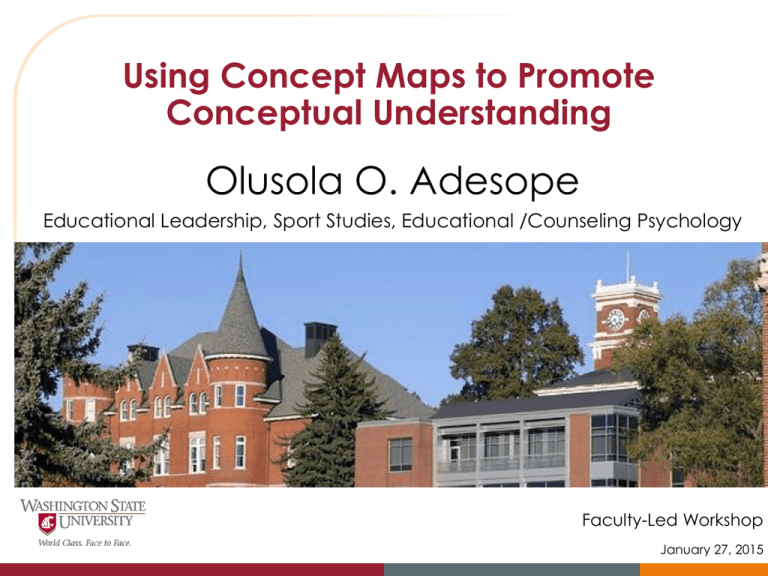
Using Concept Maps to Promote Conceptual Understanding Olusola O. Adesope Educational Leadership, Sport Studies, Educational /Counseling Psychology Faculty-Led Workshop January 27, 2015 Outline 2 Overview of My Research and Teaching Interests What Is Concept Mapping? Highlights of Research Program in Concept Mapping for Teaching and Learning Meta-analysis of concept maps (RER) Empirical (Experimental) Studies Strategies for Using Concept Maps in the Classroom Software Tools to Support Concept Mapping Activity Q&A My Interests Self-Regulated Learning Knowledge Representation STEM Education (Concept Maps) Educational Psychology Research Methods (Meta-Analysis) Multimedia Learning & Adaptive Systems Overview 4 What is Concept Mapping? Highlights of Research on Concept Mapping for Teaching and Learning Meta-Analysis of Concept Maps Empirical (Experimental) Studies Strategies for Using Concept Maps in the Classroom Software Tools to Support Concept Mapping Activity Q&A What Is Concept Mapping? A strategy for organizing and representing information A true concept map must include Concepts as nodes – usually enclosed in circles or boxes Relationships among concepts as labelled links Illustrated by lines and arrows connecting concepts Labels on those lines that highlight the nature of the relationship Concept Maps Variations of Concept Maps Knowledge maps Semantic networks Ontologies Graph Theory – Directed or Indirected Graph Topic maps Example Concept Map Node label label Node label Node label Node Node label label Node Node label Node label Node Types of Concept Maps a concept map can take many forms, provided it includes concepts and illustrates relationships through BOTH lines AND proposition statements: spider, with information organized outward around a central topic Types of Concept Maps hierarchy, with information structured from most to least important; or from most inclusive and general to less inclusive and specific Activity 1 Arrange the following three terms and connect them with arrows using these link labels (caused by; treated with; kill) Bacteria Pneumonia Antibiotics A Mini Concept Map Caused by Pneumonia Bacteria Antibiotics Variations on a Theme Pneumonia Caused by Antibiotics Bacteria Bacteria Antibiotics Can cause Pneumonia Can cause Bacteria By reversing the arrows, changing the linking words, and adding color, the focus and emphases change. Pneumonia Antibiotics Overview 13 What is Concept Mapping? Highlights of Research on Concept Mapping for Teaching and Learning Meta-Analysis of Concept Maps Empirical (Experimental) Studies Strategies for Using Concept Maps in the Classroom Software Tools to Support Concept Mapping Activity Q&A Highlights of Research Program in Concept Mapping Meta-Analysis of Concept Maps Published in the Review of Educational Research (RER) in 2006 Cited 436 times by other researchers, as of today One of the most frequently read articles in RER Set the stage for a program of research on visual displays, especially with concept map Do Researchers Care about Concept Maps? Do Student Like Concept Maps? Bahr & Dansereau (2001). Studying bilingual maps vs lists ease of learning .48 satisfaction with presentation format .46 motivation and concentration .26 confidence in future performance .44 Reynolds & Dansereau (1990). Studying hypermap vs hypertext satisfaction .87* frustration and confusion (reversed) .80* Are Concept Maps Effective for Learning? Meta-Analysis: Studies comparing maps to other learning methods N All Maps constructed U.S. and Canada Africa Taiwan Maps studied U.S. and Canada Other k Effect size (g) M 5,818 3,160 1,539 67 27 18 .60* .82* .48* 1,388 233 2,658 7 2 40 1.45* -.00 .37* 2,358 300 37 3 .37* .40* Interpreting the Meta-analysis Maps more effective for students with lower verbal ability Especially ESL students Maps more effective for central ideas than detail ideas Concept maps are generally more effective for learning than texts and outlines The Downside of Maps Constructing concept maps Students need practice to benefit from concept mapping Require software to make complex maps And the biggest problem is … COMPLEXITY IN READING MAPS!!! How do I Read this Map? My Research Program Software that integrates concept mapping with document annotation for learning gStudy Animated concept maps to reduce map shock and cognitive load Meta-Analysis Informed Experimental Studies Concept and Knowledge Maps Proposed animated concept maps to reduce complexity in reading static maps and cognitive load associated with map shock Nodes and links are sequentially added Published 6 studies on the effects of concept maps Over 10 conference presentations on different experiments on concept maps Two studies under preparation Overview 24 What is Concept Mapping? Highlights of Research on Concept Mapping for Teaching and Learning Meta-Analysis of Concept Maps Empirical (Experimental) Studies Strategies for Using Concept Maps in the Classroom Software Tools to Support Concept Mapping Activity Q&A Strategies: Complete Fill-in 25 fill-in blanks in pre-structured map from a list of concepts helps students to consolidate understanding of concepts and relations among them Strategies: Partial Fill-in 26 Strategies: Fill-in-the-Propositions SOUND General Chuck Y eager s pe e d v longitudinal w ave fre que ncie s w ave length Bell X-1 20-20,000 Hz "Glamourous Glennis" October 17, 1947 f requency f hum an he aring 15-50,000 Hz canine he aring Yeager's w ife Muroc Dry Lake Beds, CA Edw ards AFB Wave Equation Dr. Paul M. Rutherford Instr uctor Lee's Summi t Technology Academy Lee's Summi t, MO 1000-150,000 Hz bat he ar ing Strategies: Fill-in-the-Propositions SOUND was fi rst broken by General Chuck Y eager whose is a s pe e d v tr avels i n longitudinal w ave in a fre que ncie s Bell X-1 "Glamourous Glennis" after Yeager's w ife of w ave length nam ed 20-20,000 Hz 15-50,000 Hz 1000-150,000 Hz the r ange of the r ange of the r ange of hum an he aring canine he aring on October 17, 1947 at Muroc Dry Lake Beds, CA now known as Edw ards AFB f requency f which is call ed the Wave Equation Dr. Paul M. Rutherford Instr uctor Lee's Summi t Technology Academy Lee's Summi t, MO bat he ar ing Strategies: Pre-Selected Term Mapping 29 Design a concept map to show your understanding of CO2, a greenhouse gas, and its past and future effect on climate. Use the following concepts: fossil fuels deforestation clouds atmospheric water vapor ocean CO2 Industrial Revolution longwave solar radiation global warming human activity evaporation transpiration greenhouse gas concentrations ice albedo photosynthesis feedback loops shortwave solar infrared radiation Strategies: Seeded Term Mapping also called "micro-mapping" provide students with a list of "starter" or "seed" terms (5-6) students must use these terms in their map AND use another 5-6 terms from their own knowledge of the topic Strategies: Advanced Organizer develop an expert map of a course topic provide to students as an advance organizer prior to teaching and for review purposes Strategies: Advanced Organizer Strategies: Unguided Maps Once students are familiar with concept mapping processes, they can also be asked to do unguided maps, e.g. After reading a section of text, At the end of a topic. At the end of the course. This helps with identifying and tying together core concepts, and also acts as a learning tool for test revision. Overview 34 What is Concept Mapping? Highlights of Research on Concept Mapping for Teaching and Learning Meta-Analysis of Concept Maps Empirical (Experimental) Studies Strategies for Using Concept Maps in the Classroom Software Tools to Support Concept Mapping Activity Q&A Software Tools for c_Mapping Kidspiration Inspiration MatchWare OpenMind Microsoft Visio SmartDraw cmapTools cmapTools cmapTools – Free online tool built for collaborative concept mapping, can attach video, images, files, links, and other external resources, export function Overview 37 What is Concept Mapping? Highlights of Research on Concept Mapping for Teaching and Learning Meta-Analysis of Concept Maps Empirical (Experimental) Studies Strategies for Using Concept Maps in the Classroom Software Tools to Support Concept Mapping Activity Q&A Stages in the Construction of a Concept Map Brainstorming Stage Organizing Stage Layout Stage Linking Stage Revising Stage Finalizing Stage Activity 2 Using the following concepts and labels, draw a concept map of the human nervous system Central nervous system Somatic nervous system 100 billion neurons Voluntary movements Human nervous system Parasympathetic system Spinal cord Hand waving Peripheral nervous system Involuntary actions Autonomic nervous system Brain Sympathetic system Heart beat Three pounds for adults LABELS consists of weighs includes controls such as Activity 3 Draw a concept map describing yourself and what makes you unique from others Q&A Sola Adesope olusola.adesope@wsu.edu
